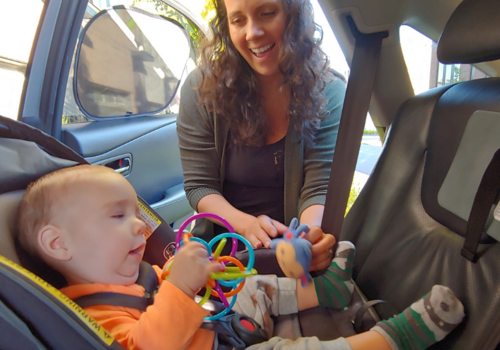Successful travel with a baby is possible without using a device for distraction. Child development experts explain why tech-free travel is a boost to a baby’s brain, psyche, and relationship with you.
My daughter Shannon, her 5-month-old son, and I had just finished a successful 8-hour car trip south and back. It wasn’t always easy, but we cajoled Cooper with chatter, songs, books and toys—none of which had a cord or battery.
The best moment was on our ride back home.
It was pitch dark when Cooper began to howl. We’d been driving for hours and I thought we were out of ideas, but Shannon had one more. She began to “read” The Very Hungry Caterpillar—completely from memory. Softly and gently, like so many times before, she recited every page.
Coop soon quieted down and was asleep before the caterpillar became a butterfly.
A few days later, Shannon clicked on a YouTube video claiming to have the inside scoop on how to travel with a baby. As she recalls:
“First, the mom-fluencer, who was sitting in the back seat, showed her husband up front behind the wheel. Then the mom panned a little bit further to reveal an iPad, already playing a video, secured by a plastic case fastened to the back seat about a foot in front of the baby’s face. I had to laugh. Ohhh. That’s the big secret?”
Why Parents Turn to Tablets
Although our trip was sans tech, Shannon considered the alternative. Continue reading →







